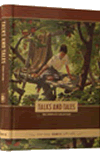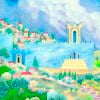Rabbi Yitzchak Alfasi, one of the greatest of the early codifiers of Jewish Law, whose name is familiar to all students of the Talmud, was born in Kalat ibn Hamad, a village near Fez, in North Africa, in the Jewish year 4773, or 1013 of the Common Era. His name "Alfasi" (or Alfes) means (in Arabic) a native of Fez. He is also known as RIF (from the initials of Rabbi Isaac Fasi).
The RIF studied the Talmud under the famous Rabbinical authorities Rabbenu Nissim and Rabbenu Hananel in Kairwan, a city not far from Fez, which, by virtue of these two great luminaries, was then one of the leading centers of Talmudic learning. Afterwards he returned to Fez, where he became the head of the Jewish community. When his two great teachers passed away (about the year 1050), Rabbi Yitzchak Alfasi became the greatest recognized Talmud authority of his day, which was the second generation after the period of the Geonim came to an end, with the closing down of the great Yeshivoth in Babylon.
In 1088, at the advanced age of 75, Rabbi Alfasi was forced to flee from his native land, because two wicked men, a father and a son, denounced him as a traitor to the government. What the charge was is unknown, but since it was the time when the Muslim Moors of North Africa were fighting the Christian kingdoms of Spain and taking over the Iberian Peninsula, it may be assumed that the RIF was accused by the two scoundrels of some political offense, which endangered his life. The RIF fled to Spain, where he was received with great honors at Cordova and Granada. A year later he went to Lucena, where he succeeded Rabbi Yitzchak ibn Ghayyat as head of the community. Here the RIF established a Yeshivah which soon became most famous, and attracted distinguished scholars. One of the youngest of his students was Rabbi Joseph ibn Migash, who came to Lucena at the age of twelve and fourteen years later succeeded the RIF as head of the academy. Rabbi Alfasi himself appointed him as his successor, although his own son Rabbi Jacob was also a great scholar. Among his students are believed to have been also the famous poets and scholars Rabbi Judah Halevi and Rabbi Moshe ibn Ezra, who composed poems in honor of their teacher.
Rabbi Yitzchak Alfasi was a man of noble character, and he took a fatherly interest in his many students. Yet from the day of his arrival in Spain he met with unfriendly opposition from two prominent Jews, both of whom, like himself, were called Yitzchak: Rabbi Yitzchak ibn Ghayyat (mentioned earlier) and Rabbi Yitzchak Albalia. The latter had a prominent position at the court of the king of Seville, but lost his position when the king was defeated by his rival. Albalia went to live in Granada but did not stop to criticize the RIF to the day of his (Albalia's) death (about 1098). However, on his deathbed, he called his son Baruch, then a boy about seventeen, and instructed him to go to Rabbi Alfasi, after his father's death, and tell him that his father had forgiven him and begged Rabbi Alfasi's forgiveness with all his heart, and that his last wish was that his son, Baruch, should be accepted as the RIF's student. When the young Baruch came to the RIF and delivered his father's message, the RIF was moved to tears. He took the young man into his home and treated him as a son, and taught him with fatherly affection.
Rabbi Yitzchak Alfasi's great and monumental work is his Halachoth, better known as the Alfes, or RIF. It is a "digest" of the Talmud, following the order of the Talmudic Mesichtoth (tractates), but leaving out much of the discussion and Aggadic material in order to give the precise and definite Halachoth (practical rulings and laws). In ascertaining the final decisions, he relied on the authority of his great teachers Rabbi Nissim and, especially, Rabbi Hananel, and on his own vast knowledge of the Talmud, both the Talmud Bavli and Yerushalmi, and the Talmudic literature of the Gaonim and all other Rabbinic literature that had been written before him.
The work was at once accepted by all Jews as a work of the highest authority, and it became the basis of future codes of Jewish Law. It was said of this great work that "It could have been written only with Divine inspiration."
Maimonides, who was a pupil of the RIF's pupil, Rabbi Joseph ibn Migash, called the RIF "my teacher," and said that the work was almost perfect. He advised his students to study it carefully together with his own Yad Hachazakah.
When Rabbi Joseph Caro, several hundred years later, compiled the Shulchan Aruch, which became the standard Code of Jewish Law, he used the Alfes together with the codes of Maimonides and Rabbi Asher ben Yechiel (Rosh) as the three pillars of his work. The Alfes has been studied, and is still studied, to this day, by students of the Talmud, and is part of the curriculum in many Yeshivoth of advanced Talmud study. Many commentaries have been written on the Alfes by some of the greatest Talmudists of later generations.
The first printed edition of the Alfes appeared in Constantinople in 1509. Since then it has been reprinted many times with various commentaries. The best edition of the Alfes was printed in Wilno (by Romm, 1881) and it appears with all regular editions of the Talmud.
Rabbi Yitzchak Alfasi passed away at the ripe old age of 90 years in Lucena (Spain), on the 10th day of Iyar (or Sivan), in the year 4863 (1103).






Join the Discussion